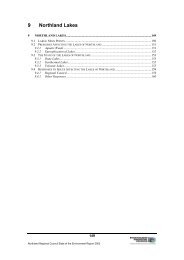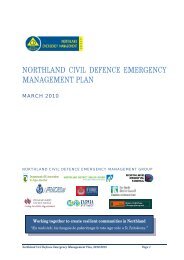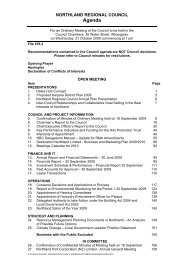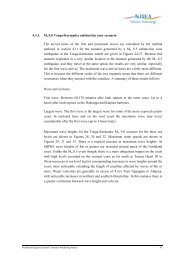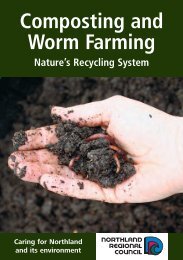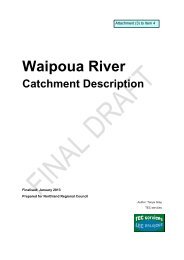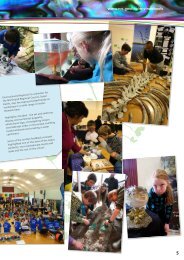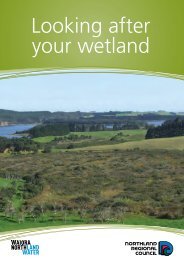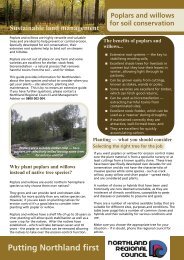Growing Poplar and Willow Trees on Farms, National - FAO
Growing Poplar and Willow Trees on Farms, National - FAO
Growing Poplar and Willow Trees on Farms, National - FAO
Create successful ePaper yourself
Turn your PDF publications into a flip-book with our unique Google optimized e-Paper software.
‘Crowsnest’), but are darker green <str<strong>on</strong>g>and</str<strong>on</strong>g> it bears much more leaf <str<strong>on</strong>g>and</str<strong>on</strong>g> a denser<br />
crown. Its juvenile leaves are larger <str<strong>on</strong>g>and</str<strong>on</strong>g> pr<strong>on</strong>e to wind damage.<br />
Ver<strong>on</strong>ese (P. deltoides × nigra)<br />
‘Ver<strong>on</strong>ese’ is a × euramericana hybrid black poplar imported from Italy <str<strong>on</strong>g>and</str<strong>on</strong>g><br />
is a good straight-stemmed <str<strong>on</strong>g>and</str<strong>on</strong>g> narrow-crowned tree. It has small leaves<br />
similar to ‘Tasman’, <str<strong>on</strong>g>and</str<strong>on</strong>g> good drought <str<strong>on</strong>g>and</str<strong>on</strong>g> wind tolerance. However, it is<br />
pr<strong>on</strong>e to rust disease in areas where high humidity <str<strong>on</strong>g>and</str<strong>on</strong>g> heavy dews occur,<br />
especially in western areas when planted in low-lying situati<strong>on</strong>s. Rust strains<br />
are variable, however, <str<strong>on</strong>g>and</str<strong>on</strong>g> currently the drier East Coast regi<strong>on</strong>s still produce<br />
excellent ‘Ver<strong>on</strong>ese’ pole material.<br />
Weraiti (P. deltoides × nigra)<br />
‘Weraiti’ has a good shaped crown with a heavier stem than most recent<br />
hybrids. It will produce a few heavier branches but not to the extent that<br />
‘Argyle’ can. It is another hybrid performing well in eastern North Isl<str<strong>on</strong>g>and</str<strong>on</strong>g><br />
areas, where it rapidly develops height <str<strong>on</strong>g>and</str<strong>on</strong>g> trunk diameter, offering good<br />
potential for timber producti<strong>on</strong>.<br />
Yeogi 1 <str<strong>on</strong>g>and</str<strong>on</strong>g> Yeogi 2 (P. alba × gl<str<strong>on</strong>g>and</str<strong>on</strong>g>ulosa)<br />
Released in 1977, ‘Yeogi 1’ <str<strong>on</strong>g>and</str<strong>on</strong>g> ‘Yeogi 2’ are hybrid cl<strong>on</strong>es from Korea.<br />
They sucker readily. They are slow rooting when grown from cuttings. Both<br />
cl<strong>on</strong>es are hardy <str<strong>on</strong>g>and</str<strong>on</strong>g> similar in their site requirements to the silver poplar.<br />
They develop better form when grown in a plantati<strong>on</strong> than when exposed.<br />
‘Yeogi’ cl<strong>on</strong>es develop heavy limbs, which makes them less suitable in<br />
exposed situati<strong>on</strong>s. For this reas<strong>on</strong> <str<strong>on</strong>g>and</str<strong>on</strong>g> the slow rooting behaviour, ‘Yeogi’<br />
is not favoured for soil c<strong>on</strong>servati<strong>on</strong>, but should be c<strong>on</strong>sidered for plantati<strong>on</strong><br />
timber since both cl<strong>on</strong>es are highly resistant to poplar rusts <str<strong>on</strong>g>and</str<strong>on</strong>g> Marss<strong>on</strong>ina<br />
brunnea leaf spot disease.<br />
The cl<strong>on</strong>es ‘Argyle’, ‘Margarita’, ‘Dudley’ <str<strong>on</strong>g>and</str<strong>on</strong>g> ‘Pakaraka’ all have very<br />
similar characteristics – generally heavy crowns <str<strong>on</strong>g>and</str<strong>on</strong>g> medium brittleness but<br />
they are ‘bulk’ growers <str<strong>on</strong>g>and</str<strong>on</strong>g> their early bark is rough which is important for<br />
protecti<strong>on</strong> from stock. The cl<strong>on</strong>es ‘Fraser’ <str<strong>on</strong>g>and</str<strong>on</strong>g> ‘Selwyn’ tend to be very<br />
erect, narrow crowned <str<strong>on</strong>g>and</str<strong>on</strong>g> slower growing types with good drought<br />
tolerance.<br />
14



